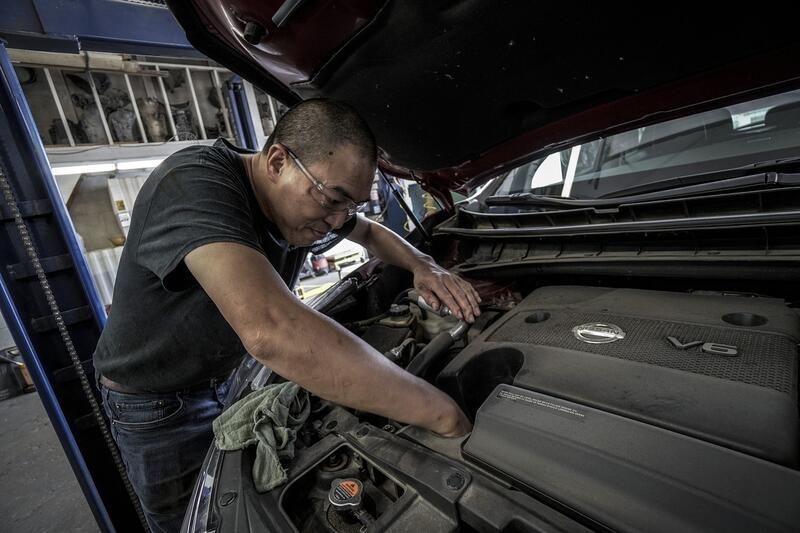Unlocking Sustainable Practices in Maintenance and repair of motor vehicles: Decarbonization Options
This article explores sustainable practices for maintaining and repairing motor vehicles, with a focus on decarbonization options to reduce emissions and promote environmental responsibility.

Decarbonisation is the process of reducing carbon emissions from various sectors to mitigate the effects of climate change. The transport sector is one of the largest contributors to carbon emissions globally, and the maintenance and repair of motor vehicles sector is no exception. This article will explore the importance of decarbonisation in the maintenance and repair of motor vehicles sector, the main sources of carbon emissions, ways of reducing carbon emissions, challenges facing decarbonisation, and the implications of decarbonisation for the sector.
What is decarbonisation in the maintenance and repair of motor vehicles sector, and why is it important?
Decarbonisation in the maintenance and repair of motor vehicles sector refers to the process of reducing carbon emissions from the activities involved in maintaining and repairing motor vehicles. The sector is an essential part of the transport industry, and it contributes significantly to carbon emissions. Decarbonisation is important because it helps to mitigate the effects of climate change, which include rising temperatures, sea level rise, and extreme weather events. The transport sector is responsible for approximately 23% of global carbon emissions, and the maintenance and repair of motor vehicles sector contributes to a significant portion of these emissions. Therefore, decarbonisation in this sector is crucial in reducing the overall carbon footprint of the transport industry.
What are the main sources of carbon emissions in the maintenance and repair of motor vehicles sector?
The maintenance and repair of motor vehicles sector contributes to carbon emissions in various ways. The main sources of carbon emissions in this sector include:
- Energy consumption: The energy used in the maintenance and repair of motor vehicles, such as electricity and fuel, contributes significantly to carbon emissions. The energy used in the sector is mainly derived from fossil fuels, which are non-renewable and emit carbon dioxide when burned.
- Waste disposal: The disposal of waste products from the maintenance and repair of motor vehicles, such as oil, batteries, and tires, contributes to carbon emissions. The improper disposal of these waste products can lead to soil and water pollution, which can further contribute to carbon emissions.
- Transportation: The transportation of motor vehicles to and from repair shops and maintenance facilities contributes to carbon emissions. The transportation of spare parts and equipment also contributes to carbon emissions.
- Chemicals: The use of chemicals in the maintenance and repair of motor vehicles, such as solvents and degreasers, contributes to carbon emissions. These chemicals are often derived from fossil fuels and emit carbon dioxide when used.
How can we reduce carbon emissions in the maintenance and repair of motor vehicles sector?
There are several ways to reduce carbon emissions in the maintenance and repair of motor vehicles sector. These include:
- Energy efficiency: The use of energy-efficient equipment and practices can significantly reduce energy consumption and carbon emissions. This can include the use of energy-efficient lighting, heating, and cooling systems, as well as the use of renewable energy sources such as solar and wind power.
- Waste reduction: The proper disposal of waste products such as oil, batteries, and tires can significantly reduce carbon emissions. Recycling and reusing these products can also help to reduce carbon emissions.
- Transportation: The use of efficient transportation methods, such as electric or hybrid vehicles, can significantly reduce carbon emissions. The use of public transportation or carpooling can also reduce carbon emissions.
- Chemicals: The use of environmentally friendly chemicals, such as biodegradable solvents and degreasers, can significantly reduce carbon emissions.
What are the challenges facing decarbonisation in the maintenance and repair of motor vehicles sector?
There are several challenges facing decarbonisation in the maintenance and repair of motor vehicles sector. These include:
- Cost: The cost of implementing energy-efficient equipment and practices can be high, which can be a barrier to adoption, especially for small businesses.
- Lack of awareness: Many businesses in the maintenance and repair of motor vehicles sector are not aware of the benefits of decarbonisation, which can hinder adoption.
- Lack of incentives: There is a lack of incentives for businesses to adopt decarbonisation practices, which can hinder adoption.
- Lack of regulation: There is a lack of regulation in the maintenance and repair of motor vehicles sector, which can hinder the adoption of decarbonisation practices.
What are the implications of decarbonisation for the maintenance and repair of motor vehicles sector?
Decarbonisation has several implications for the maintenance and repair of motor vehicles sector. These include:
- Increased demand for green products and services: As consumers become more aware of the impact of carbon emissions, there will be an increased demand for green products and services in the maintenance and repair of motor vehicles sector.
- Increased competition: As more businesses adopt decarbonisation practices, there will be increased competition in the sector.
- Increased innovation: Decarbonisation will drive innovation in the maintenance and repair of motor vehicles sector, leading to the development of new products and services.
- Improved public health: Decarbonisation will lead to improved air and water quality, which will have a positive impact on public health.
Conclusion
Decarbonisation in the maintenance and repair of motor vehicles sector is crucial in reducing the overall carbon footprint of the transport industry. The main sources of carbon emissions in this sector include energy consumption, waste disposal, transportation, and chemicals. Ways of reducing carbon emissions in the sector include energy efficiency, waste reduction, transportation, and the use of environmentally friendly chemicals. Challenges facing decarbonisation in the sector include cost, lack of awareness, lack of incentives, and lack of regulation. The implications of decarbonisation for the sector include increased demand for green products and services, increased competition, increased innovation, and improved public health.